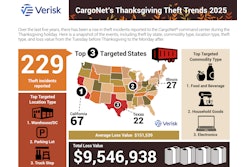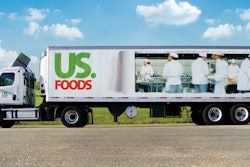Despite widespread forecasts predicting a recovery, the trucking industry faced a stagnant 2025, with October tonnage hitting its lowest level in nearly two years due to a combination of federal policy uncertainty and economic headwinds. Analysts attribute this underperformance to companies pausing capital investments amid tariff volatility, a surprise 8-10% decline in housing starts, and weakened manufacturing activity that failed to rebound as expected. Compounded by persistent inflation and high interest rates that have stressed consumer spending power and slowed housing turnover, the sector is projected to finish the year potentially below 2024 levels, with the first half of 2026 expected to remain tepid as the market lacks a clear catalyst for substantial growth.
Contents of this video
Speaker 1:
Trucking in 2025 sucked, but why? Hey everybody. Welcome back to the 10 44 and Happy Black Friday. I'm Jason Cannon and my co-host is Matt Cole. By late 2024, just about every economist, analyst and every economic signal pointed to improve trucking conditions for 2025 that didn't happen, and minus a short-lived recovery and tonnage in August when tonnage hit its highest level since February, 2023, motor carriers haven't seen sustained periods of growth this year.
Speaker 2:
Tonnage in October hit its lowest level since January and compared with a year earlier, tonnage in October experienced its largest decline this year. October's drop was the largest in 21 months, 10 months into 2025. Tonnage was at practically the same level. It was just after we all rang in the new year.
Speaker 1:
So how exactly did some of the smartest people in the world all predict a recovery that never happened?
Speaker 3:
The best explanation we have is really the policy uncertainty associated with the federal government caused a lot of firms to essentially hit the pause button on hard to reverse investments. And so it's not even to me so much the tariff rates themselves. I think the August data puts the effective tariff rate at oh little over 10%, but it's been just sort of the, they're on, they're off, they're changing now they're covering this now they're not covering this. And what we've had happen is firms just essentially say, Hey, we don't want to hire people. We don't want to make capital investments unless we're really certain about them. And what that's meant is we haven't had the additional sort of influx of freight demand that we thought we were going to have.
Speaker 2:
The sector where this shows up most heavily is in single family housing starts a large driver of on highway freight
Speaker 3:
Housing activity has been down year over year in 2025. In terms of starts, if somebody would've said that last year in let's say December, that housing will be weaker in 25 than 24, you would've been laughed at. And I know when I was sort of building out my forecast, thinking about 25, I was anticipating an eight to 10% uptick in housing starts. Instead, we've had an eight to 10% decrease in housing starts. And so you've had that and I think now as we're moving through this fourth quarter, we're starting to feel a little bit of the impact of declining containerized import volumes. There's just simply not as much stuff that is needing positioned right now around the holiday season. And so if anything, I wouldn't be surprised if over the next couple of weeks we actually start underperforming in terms of tender rejection rates and even potentially spot rates compared to where we were last year. Once we remove changes in fuel prices,
Speaker 1:
The consumer price index for all items increased by 3% for the 12 months ending September, 2025. Core inflation, which excludes volatile food and energy prices also increased by 3% for the same 12 months. Neither of those things are good for consumers and none of it's good for freight.
Speaker 3:
So the consumer has been under, again, more stress than folks expected. Again, I think it's come from multiple sources. So one issue is, I don't want to get into conspiracy theory realm here, but when you look at companies that scrape pricing data from the web, like data weave as an example, there was recently A-C-N-B-C article showing some of their data. They've reported much more pronounced price increases for products from Amazon, Walmart, target, and things like hardline products, so electronics, furniture and whatnot than what we're seeing showing up in the CPI. So it could be a little bit consumers drawing down some spending because maybe price increases are a little bit higher, at least from the places that a lot of us think of buying than what we expected. I think people aren't moving as much. The hiring rate is very muted right now where basically companies are hiring people at the same rate they did in 2010 in the aftermath of the global financial crisis, and so people aren't moving as much.
So if you're not moving, people aren't replacing furniture as often. That's less carpet, that's less of all of these things. And so I think that that's playing a little bit of a role. And again, I think we haven't seen interest rates come down to the degree. I think folks, again, were expecting credit card interest rates are so high anyway, but even one or two percentage points makes a lot of difference. And I think in general, more than anything, we just saw a substantial weakening of manufacturing new order activity, both the Federal Reserve Banks and Institute for Supply Management. We were in a really nice strong uptick going through January and basically the bottom fell out of that upward momentum starting in February and March. And again, that corresponds to the onset of a lot of these tariff policies. And so I think that it's that consumer not really getting more spending power then coupled with just in general manufacturing activity, not rebounding in the way that folks expected it to, has put us in a position where there just has not been the amount of freight volume that we thought there would be
Speaker 2:
With four weeks left in this year. Jason says a best case scenario is it trucking ends 2025, exactly where it started.
Speaker 3:
We actually started to see capacity tighten up quite a bit in December of 24 and then especially into January of 25. Granted, we had some really extreme weather and one thing for everybody to keep an eye on, we're already starting to see some signs that winter may be really showing up here even next week to some degree. And so we have to keep in mind those weather effects that can hit spot rates and tender rejections and things like that. But I think the best case scenario is we finish this year out right where we were at the end of 24. I think probably my base case is actually it underperforms a little bit for 24. I just don't think the consumer is going to show up quite as much this holiday season. One thing I'm watching very, very closely, and at the time of filming, we've seen the stock market have some major gyrations.
We'll see how this plays out by the time this airs, but I do wonder if some of the folks have either taken profits and they'll go spend money that way, or if folks get a little nervous and say, maybe I'm going to dial it back just a bit. But we have to sort of see on that front. But in general right now, I mean the cardboard box, shipment state got a lot of attention for Q3 and it was weaker than last year, and so I think that that captures the sentiment that everybody's had is just that it's not been the year that we thought it was. And then the question is, does 26 look a lot better or do people think 26 could be 25 or maybe even a muted version of what we thought 25 would be? That's kind of where I'm at as I'm looking into next year, is barring a collapse in the AI ecosystem, I don't see us falling into a recession, but I also think that if certainly for the first six months of next year, it's going to be fairly tepid freight demand. I mean, I'm not expecting substantial year on year increases, at least over the next six to seven months. We just don't have a catalyst in place for that.
Speaker 1:
That's it for this week's 10 44. You can read more on ccj digital.com. While you're there, sign up for our newsletter and stay up to date on the latest in trucking industry news and trends. If you have any questions or feedback, please let us know in the comments below. Don't forget to subscribe and hit the bell for notifications so you can catch us again next week.










